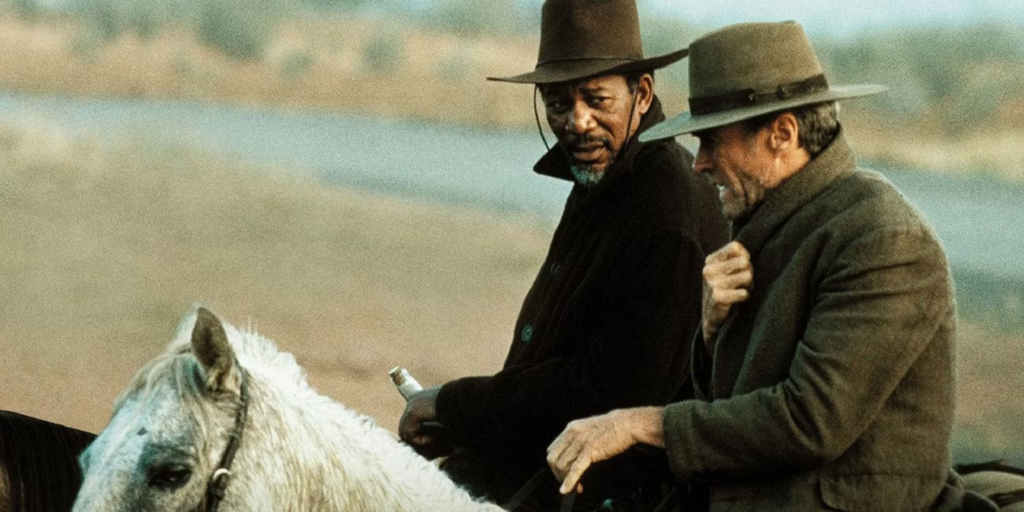Clint Eastwood played an angry cowboy in Unforgiven, his best western. The 1992 Best Picture was a masterpiece thanks to Gene Hackman’s Academy Award-winning performance, Morgan Freeman, and Richard Harris.
It deconstructed Eastwood’s career, the genre, and the wild west, garnering critical praise and reverberating across the cinema community. The film has the finest 10 minutes in Western cinema, notwithstanding its intrinsic poeticism.
What’s ‘Unforgiven’ About?
Eastwood portrays widower William Munny, who has given up crime. He’s an angry farmer who used to be a feared killer and outlaw. The Schofield Kid (Jaimz Woolvett), a cocky new gunman, offers to murder two prostitute-defacing criminals. He reluctantly takes one more job with his old buddy Ned Logan (Morgan Freeman) to offer his children a better existence.
Sheriff Little Bill Daggett (Gene Hackman) is restricting weapons in Big Whiskey, where the abuses occurred. He punishes English Bob (Richard Harris), who tries to steal the prostitutes’ reward. W.W. Beauchamp (Saul Rubinek), Bob’s companion author, sees his book’s subject fail and turns to Little Bill.
Munny, Logan, and the Kid arrive to Big Whiskey overnight. While Ned and the Kid enjoy the prostitutes, a feverish Will attacks Little Bill in the saloon and beats him to death, urging him to never return. After Will recovers, they murder a culprit, but Ned quits.
The Schofield youngster kills the last outlaw, but it shakes him. Will and the Kid learn that Little Bill has horribly slain Ned during their moment. Munny rages. He drinks a lot of whiskey and prepares to avenge his friend’s murder, setting up one of Western history’s most thrilling scenes.

Intoxicated Munny braves Greely’s with a double-barreled shotgun. He asks who owns the area while drenched. Skinny Dubois (Anthony James) valiantly responds and is shot.
Munny severely wounds Little Bill and kills all his opponents in the gunfight. He kills Little Bill with one last shot and sends a frightening warning to his enemies.
Greely’s Shootout’s Importance
The Greely’s gunfight embodies western bravado and Clint Eastwood’s appeal as a gun-slinging cowboy. It’s the finest Western movie plot by far. The torrential rain falling on Munny and the booming thunder following this angel of death as he approaches his victims show its allure.
Westerns are known for their quick-draw duels, gambling saloons, and romanticization of violence. Eastwood’s brushstrokes are smoother than Sergio Leone and Sergio Corbucci’s westerns. Unforgiven adds authenticity to these last duels.

Guns jam, bullets miss, and hesitance shows how raw and dirty the West is. Cold-blooded killers will win, and those who hesitate will be shot. Munny wins. He freely admits to killing women and children. Standing in front of an indifferent man is the scariest thing.
This conclusion is also reflective. Eastwood deconstructs and destroys his past using Hitchcockian suspense. Little Bill symbolizes his Dirty Harry character—a lawman who breaks the rules and follows his own rules. After realizing this, viewers are encouraged to revisit his work and consider its significance.
Eastwood sheds his skin by violently murdering Little Bill, demonstrating his auteurial style. He completes the circle. He employs a Western to tarnish his previous characters, who are Westerns. Beauchamp’s terror when he tried to write about Munny illustrates this damage.

This isn’t enjoyable. Instead, his earlier representations and Munny’s rage should be criticized. It’s a stunning meta-cinema that encourages rewatches.
U.S. History
Its smart critique on American history may be more important than its genre transgression. The shootout is important, but the aftermath is too. Munny leaves the saloon with Ned’s Spencer Rifle and warns the survivors not to injure any more prostitutes or he would murder them all. The American flag is behind him. This may criticize the nation’s past. America has a bloody history.
While some may consider the slaughter necessary, especially in establishing the USA’s freedom and independence, it ensures that the country’s history will always be filled with horrible bloodshed. The dramatic finale is him galloping into the night on a pale horse like the grim reaper.
Violence—like Munny—will always exist. If necessary, he will return with a vengeance. Like Munny, it’s sometimes right, sometimes wrong, and always morally ambiguous.
Clint Eastwood leverages the Western’s magnificence to subvert its norms in its powerful finale. While expressing his views on his nation’s founding. It is a virtuoso at the height of his authorship and a tribute to his filmmaking sensibility.
Eastwood has done great Westerns previously, but Unforgiven reveals that murdering a guy is awful. The glorifying sequence of a genre that built American film has little to do with deserving.

